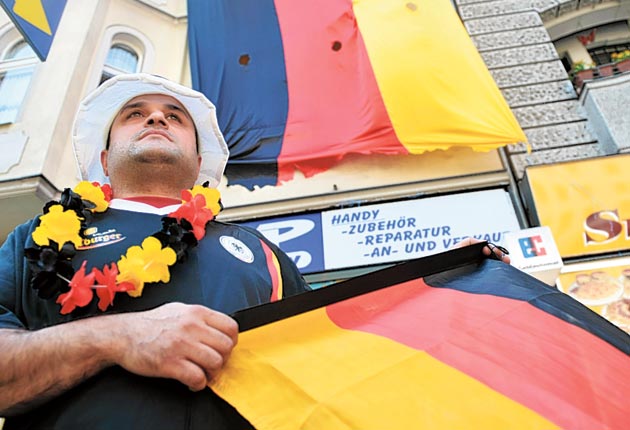Why Germany's immigrants fly the flag for their adopted country

Your support helps us to tell the story
From reproductive rights to climate change to Big Tech, The Independent is on the ground when the story is developing. Whether it's investigating the financials of Elon Musk's pro-Trump PAC or producing our latest documentary, 'The A Word', which shines a light on the American women fighting for reproductive rights, we know how important it is to parse out the facts from the messaging.
At such a critical moment in US history, we need reporters on the ground. Your donation allows us to keep sending journalists to speak to both sides of the story.
The Independent is trusted by Americans across the entire political spectrum. And unlike many other quality news outlets, we choose not to lock Americans out of our reporting and analysis with paywalls. We believe quality journalism should be available to everyone, paid for by those who can afford it.
Your support makes all the difference.With Germany fielding its most ethnically mixed World Cup side on record, the country's immigrant Turkish and Arab population is showing unprecedented support for the national 11 by flying Germany's red, black and gold flags from cars, restaurants and businesses.
But while the display of patriotic fervour has been welcomed by Chancellor Angela Merkel's government as a sign of long-awaited "positive integration", it has infuriated Germany's radical leftwing anarchist scene which has begun a war against flag-flying immigrants.
Several German anarchist publications have denounced the flags as "Black red and gold rags" which encourage "dangerous nationalist tendencies". So-called "anarchist commandos" have raided Turkish and Arab businesses in Berlin, either ripping down or burning football flags on public display.
Ibrahim Bassal, a German of Arab descent who owns a mobile phone shop in Berlin's ethnically mixed Neukölln district, started hanging a 50ft German tricolour from the top of his shop building when the World Cup began. The flag has been torn down several times and once an unknown assailant set fire to it in the early hours of the morning.
Mr Bassal said that before the attacks, a group of 16 aggressive, black-clad young Germans entered his shop and accused him of "arousing Nazi sympathies" with his flag. "We have been living in and working in Germany for decades and our children were born here," Mr Bassal complained earlier this week. "Of course we support Germany. What's that got to do with Nazis? What's the problem?"
Scores of other Berliners with Turkish and Arab roots have complained of similar attacks in which flags have been torn off cars or shop fronts and sometimes shredded or burned. A group calling itself "Kommando Kevin-Prince Boateng" has indirectly claimed responsibility for the flag war after posting a notice on the Indymedia website calling for the "capture" of German flags. Boateng, a Portsmouth midfielder playing for Ghana in the World Cup, put German team captain Michael Ballack (Chelsea) out of the tournament with a foul in May's FA Cup final.
The anarchists' reaction is not new. Berlin's radical left-wing activists launched similar campaigns in 2006 when Germany was hosting the World Cup. They stole hundreds of flags in the city's Friedrichshain district and pelted soccer supporters with water bombs.
During the 2008 European championships German flags were stolen, shredded and hung from lampposts as anarchist "trophies". However this tournament marks the first time that immigrants have been targeted for flying the German flag. "They see us as immigrants," Mr Bassal said of the anarchists. "They don't understand that Germans who aren't from Germany support the national side." While much of that support stems from the fact that Turkey, the country of Germany's largest, 1.7 million- strong, immigrant group, is not playing in the contest, the huge backing given to the side by Germans with Turkish and Arab roots is undoubtedly due to the ethnic mix of the players.
The German squad has a higher number of players from diverse ethnic background than at any time in its history. Around half the players were born abroad, have parents who were born abroad or have one non-German parent. One of the side's biggest stars is Mesut Ozil, the son of Turkish parents whose goal sent Germany through to the second round of the World Cup. The enthusiasm for Ozil was on show during the Germany-England game last Sunday, when hundreds of Berlin's Turkish residents flocked to the city's football fan mile draped in German national flags. Commentators have noted that half of the German current side would have not have been allowed to compete little more than a decade ago because the country's strict citizenship laws, which used to be based on "German blood ties", would have barred them.
Yet when it comes to national sporting highlights such as tonight's Germany-Argentina showdown, immigrants like Berlin's Ibrahim Bassal remain defiant. A neighbourhood "flag watch" has been set up in his district to safeguard the honour of the German tricolour hanging from his building. "We won't let our pride be taken away," he insists.
Join our commenting forum
Join thought-provoking conversations, follow other Independent readers and see their replies
Comments